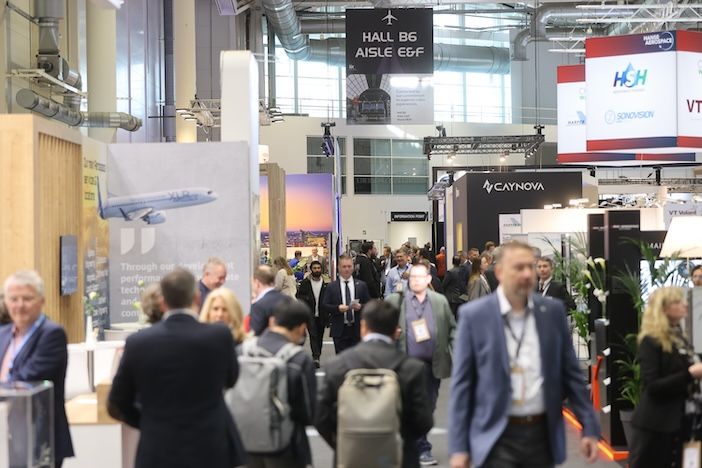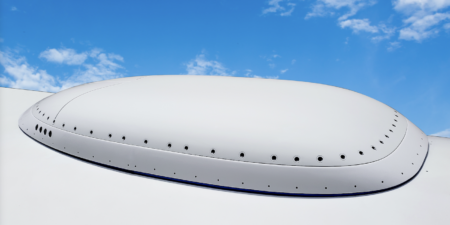Airline CEOs, procurement leaders, engineers and passenger experience specialists from across the globe converged at this year’s Aircraft Interiors Expo (AIX) in Hamburg, making it clear that innovative, novel cabin solutions are central to how commercial airlines compete for and connect with passengers.
The presence of so many high-level individuals at the event (8-10 April) sent a clear message: innovation in aircraft interiors is not just a design choice – it is a strategic priority.
Over the three days of the event, AIX welcomed representatives from 170 airlines, with more than 13,000 attendees exploring cutting-edge products and services that will revolutionise cabin interiors over the coming years.
Explaining the value of the show, on attendee, Shoaib Ahmed, technical procurement manager at Riyadh Air, commented: “We recently ordered 72 Boeing 787s and 60 Airbus A321s, so we came to AIX to find the best products for our new aircraft. The show has been very insightful, especially in meeting IFE providers, and I was very impressed with the R&D on display this year.”
Another visitor, Chris Hulbert, cabin performance technical team leader at British Airways, said: “What’s great is that you get to meet smaller companies we haven’t heard much about, and there are real gems in there. You’d never find them just from emails. The beauty of it all being under one roof is you can block out three days and tick off a lot.”
Nutsupang Pitakapan, aircraft project development at Thai Airways International Public Company, added: “Thanks to visiting AIX we are now considering new suppliers that we didn’t even know about before coming to the show. We have come away with new ideas and knowledge of technologies that we had not heard about. I would give it 6 out of 5 stars!”
The place for major announcements
The AIX show began with major announcements from some of the aircraft interiors industry’s leading players, including Airbus, Collins Aerospace (Collins), Insperial, Panasonic Avionics (Panasonic), Recaro Aircraft Seating (Recaro) and Thales.
In-flight entertainment and connectivity (IFEC) continued to be a sector driven by innovation. On the opening day of AIX, Airbus and Panasonic Avionics announced a Memorandum of Understanding (MoU), which signified a pivotal moment for the future of connected aircraft. Subject to a definitive agreement later this year, the partnership will explore leveraging Panasonic’s next-generation in-flight entertainment (IFE) hardware and software server platform, Converix, to co-develop Airbus’ future Connected Aircraft platform.
Tim Sommer, Airbus’s VP of the Connected Aircraft programme, stated: “Panasonic Avionics’ experience as a world-leading IFE provider, combined with Airbus’ experience as a world-leading aircraft OEM and integrator of digitally enabled end-to-end operations, brings together the best of both worlds. This will benefit both airlines and their passengers.”
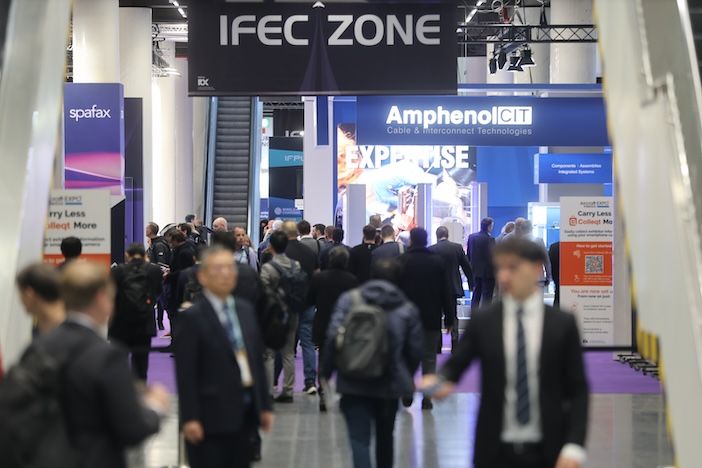
Meanwhile Viasat, a global leader in satellite communications and in-flight connectivity (IFC), announced its next-generation solution for commercial aviation, Viasat Amara. Powering the new IFC solution are innovations in core satellite network design, hardware advancements, and a suite of digital products, all of which provide scalability that will enable airlines to differentiate and future-proof their onboard passenger experience.
Accessibility remains a key focus
Collins Aerospace strengthened its commitment to accessible air travel by revealing updates to its Prime wheelchair seating solution. Focused on improved accessibility, functionality and flexibility, the updated Prime system now features a “custom transformable monument” that seamlessly transitions between a fully equipped passenger amenity station for electric wheelchair users and a crew service area.
Addressing enhanced accessibility for passengers with reduced mobility and visual impairments, Diehl Aviation unveiled advancements in lavatory design at AIX. For visually impaired travellers, the aircraft interiors manufacturer presented new lighting scenarios within the lavatory, employing contrast and highlighted signage to aid in locating essential components such as the faucet and soap dispenser. Complementing these features, the lavatory incorporates braille characters and a synthetic voice system that audibly identifies features such as the flush push-button.
Diehl also displayed an innovative “twinning lavatory” concept that allows cabin crew to fold away the partition between two lavatories, creating space for a passenger and their wheelchair.
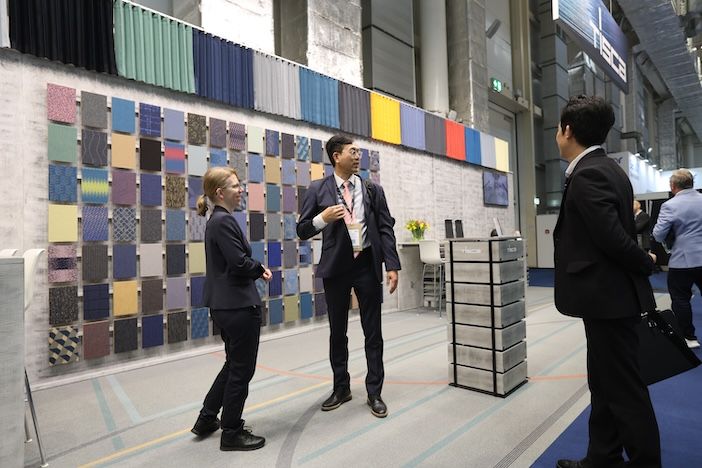
Preparing for eVTOL flights
In addition to revealing its latest range of products and innovative technologies, aimed at redefining passenger comfort and premium quality, Recaro also revealed an eVTOL seating solution for the first time, alongside Embraer spin-off, Eve Air Mobility. Utilising lightweight materials, such as high-grade aluminium, titanium and composite materials, the seat maintains minimal weight, enabling energy-efficient flight operations.
In other aircraft interiors news…
Insperial used AIX as a platform to announce its acquisition of fellow exhibitor, MGR Foamtex, a leading UK-based manufacturer specialising in interior soft goods and advanced passenger upholstery systems, which now sits alongside its other sister companies, Perrone Leather and Adhetec.
Ned Lunnon-Wood, account executive at IBA Group, a full-service aviation intelligence and advisory company, said of the event: “AIX is a great opportunity to meet the people you’re talking to daily, without the limits of scheduled meetings. There’s such an eclectic mix of suppliers in aviation, and walking through these vast halls puts things in perspective – it really helps connect the dots, giving direction. The show is full of opportunity, informative and exciting.”
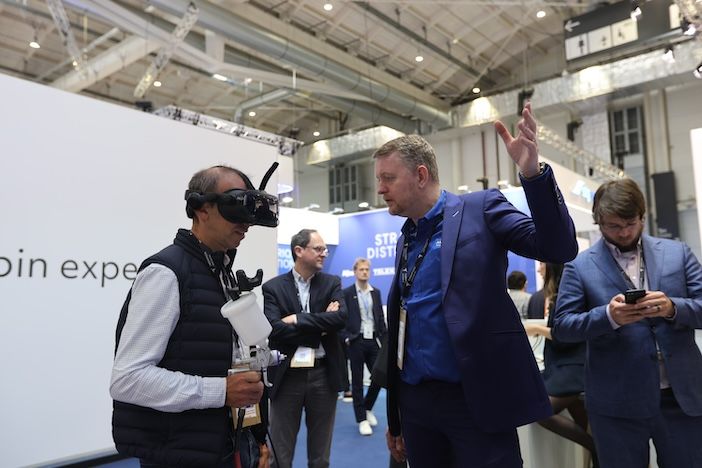
Exploring the key trends at CabinSpace Live
AIX once again provided an opportunity to understand the trends that will shape the cabin of tomorrow. The two-day CabinSpace Live programme featured leaders from Boeing, Cirium, Hughes, Flightpath 3D, and many more, with insightful conversations and panel discussions covering passenger experience, IFE, sustainability, connectivity and cabin interiors.
The first day opened with the session ‘Connectivity: Choosing the right fit’. Moderated by Corinne Streichert of IFECtiv LLC, the panel featured experts from satellite companies such as SES, antenna systems providers such as ThinKom, and network systems providers such as Hughes, alongside Katsunori Maki from All Nippon Airways (ANA). The panel sought to address the increasing complexity airlines face when selecting in-flight connectivity solutions, ranging from air-to-ground to satellite solutions. The lively discussion guided airlines through the various options available, helping them determine the most suitable connectivity solutions for their specific needs and operations.
Later in the day the session ‘Connected cabin: Making the most of artificial intelligence’ brought together an expert panel exploring the vast potential of connected cabin technologies for airlines. The panel featured Reza Rasoulian of Hughes Network Systems, Mike Moeller of Quvia, and Antonio Penim of APEX, who highlighted how AI-powered solutions can drive increased profitability and streamline operations across various aspects of the airline business. From areas including IFE, MRO, and enhanced passenger personalisation, the numerous opportunities for airlines to leverage AI within the connected cabin environment to improve efficiency and the overall passenger experience were made clear to the audience.
On day two, Gary Weissel, managing officer at Tronos Aviation Consulting, and Andrew Doyle, senior director, market development at Cirium, revealed an exclusive look at how the fleet and interiors market will evolve over the next decade, including a global fleet forecast, interior market trends, challenges and production forecasts, as well as touching on how new global tariffs could impact airlines and demand for concepts.
With this year’s Crystal Cabin Awards winners revealed during AIX, visitors to the show were able to get a deeper understanding of the innovative aircraft interior concepts during a series of presentations from the people behind the solutions.
Among the most popular designs featured were Diehl’s fully recyclable overhead storage solution, Eco Bin, which is set to advance sustainable travel; an IFE system developed by Tongji University that utilises compact projectors and gesture recognition in place of traditional seatback screens to project content on tray tables, windows or wherever passengers want to watch; and Cathay Pacific, JPA Design and Reaktor’s Aria Suite which features an in-seat IFE interface that allows users to check lavatory availability without getting up – a longstanding aim of cabin system designers.
Discussions at the PEC
The knowledge sharing and future gazing discussions were not limited to the AIX show floor. The highly acclaimed Passenger Experience Conference (PEC) preceded AIX on Monday, 7th April, with a full day of speaker sessions and panels discussing the future of passenger experience innovation and solutions.
This year’s PEC covered three main areas – Collaboration Initiatives, Engagement Initiatives, and Transformation Initiatives. Of particular interest to attendees were sessions on how the aviation and rail sectors can learn from one another, with an insightful round table discussion featuring representatives from Tangerine, Trenitalia, Expliseat and Sekisui Kydex, discussing how to evolve the passenger experience.
Kicking off this year’s conference, Jo Rowan, associate director of strategy and customer experience design at the PriestmanGoode design consultancy, provided the latest insights into accessible travel. Highlighting how public transport for those with hidden or visible disabilities remains an uncomfortable experience, she discussed how the aviation sector is addressing complex spatial challenges.
She said: “We need to give all passengers confidence and dignity”, to ensure that cabin interiors deliver a quality experience to all passengers. She demonstrated how PriestmanGoode adopts a ‘Design with Empathy’ approach, by understanding the needs and diverse perspectives of today’s travellers to challenge the norm.
Continuing the theme of accessibility, Jo Rowan was joined by John Morris, founder of WheelchairTravel.org, Shawn Raybell, director of business development at Collins Aerospace, and Axel Becker, manager, trend research, cabin and cargo, future cabin performance & design at Airbus. Together they commended the innovation within the cabin, particularly when it comes to bringing wheelchairs onboard. Raybell commented that: “Collins is ready for wheelchairs at the front of the aeroplane,” and that many hurdles have been overcome, with the manufacturer doing its best to accelerate the necessary change.
While much of the eVTOL development landscape seems geared towards smaller, luxury air taxis, Sora Aviation presented a contrasting vision at PEC. Furqan, CEO of Sora Aviation, showcased a future where eVTOL travel is inclusive, envisioning safe, rapid and comfortable journeys for a broader public. The company’s Sora S-1 prototype was digitally presented, a 30-seat eVTOL ‘bus’ for urban transit, promising more affordable fares and a familiar passenger experience. Sora’s dedication to putting people first was evident in its collaboration with Orson Associates, ensuring passenger and operator needs are fundamental to the aircraft’s design from the outset.
During the session, Furqan and Ben Orson of Orson Associates detailed the advantages of their ground-up, passenger-focused design approach. They shared insights gleaned from established commercial and private aviation practices, underscored their prioritisation of accessibility and sustainability, and outlined research conducted with the University of the Arts London on seamlessly incorporating these innovative aircraft into diverse everyday lives.
Diversity, equity and inclusion in aviation
In a special lunchtime event on Wednesday, 9 April, the Women in Aviation Leaders Panel convened for a compelling discussion titled ‘Harmony in Leadership: Navigating Vision, Values, and Impact’, hosted by Viasat.
The session featured prominent women leaders from across the aviation industry, including Mervi Moldakainen of Finnair, Kara Nishida of Delta, Suzanne d’Arnault of KLM, and Michelle Muñoz-Talcott of Viasat. These leaders shared their insights on balancing strategic vision with core values to drive impactful innovation and success.
Onwards to AIX 2026
Archana Dharni, event director of AIX, said of the event: “The quality of conversations, from business meetings to informational seminars, has been outstanding this year. We’ve welcomed familiar faces, alongside newcomers, and seen many unveilings and product launches. All in all, it has reminded us that AIX is the place to be for the aircraft interiors industry. We look forward to next year, seeing what’s in store for the next generation of aircraft interiors.”
Aircraft Interiors Expo (AIX) 2026 will take place in Halls B1-B7 at Hamburg Messe, Germany, from 14-16 April 2026.


